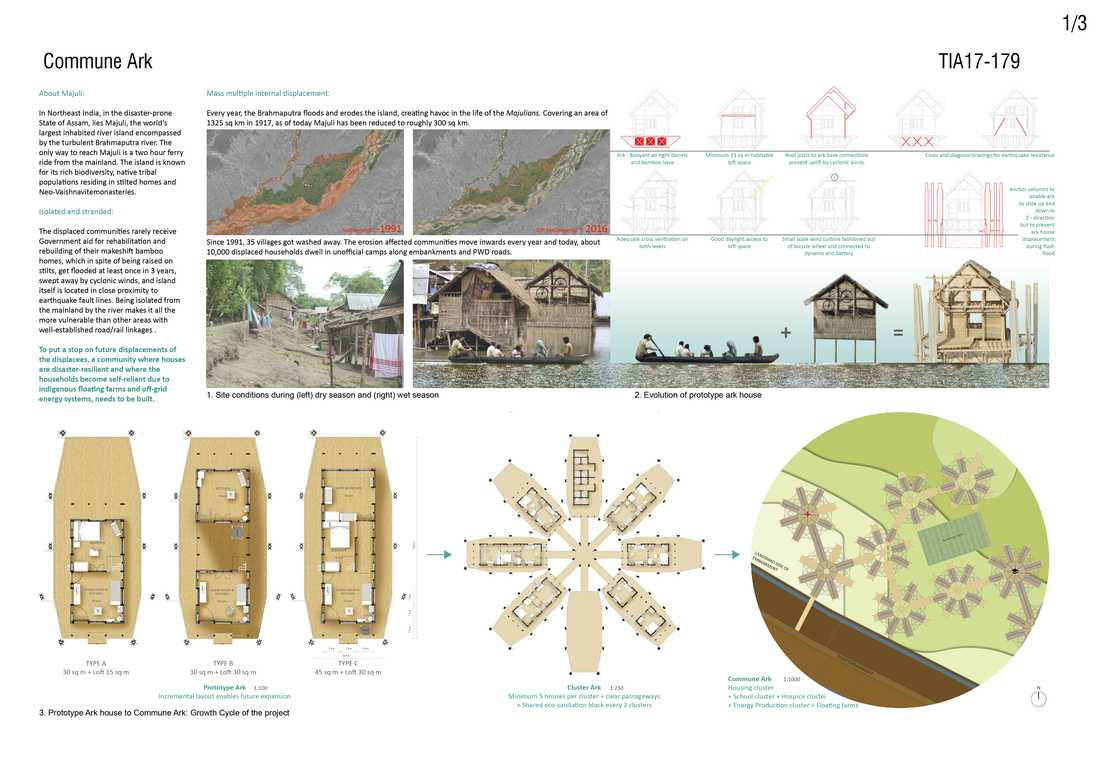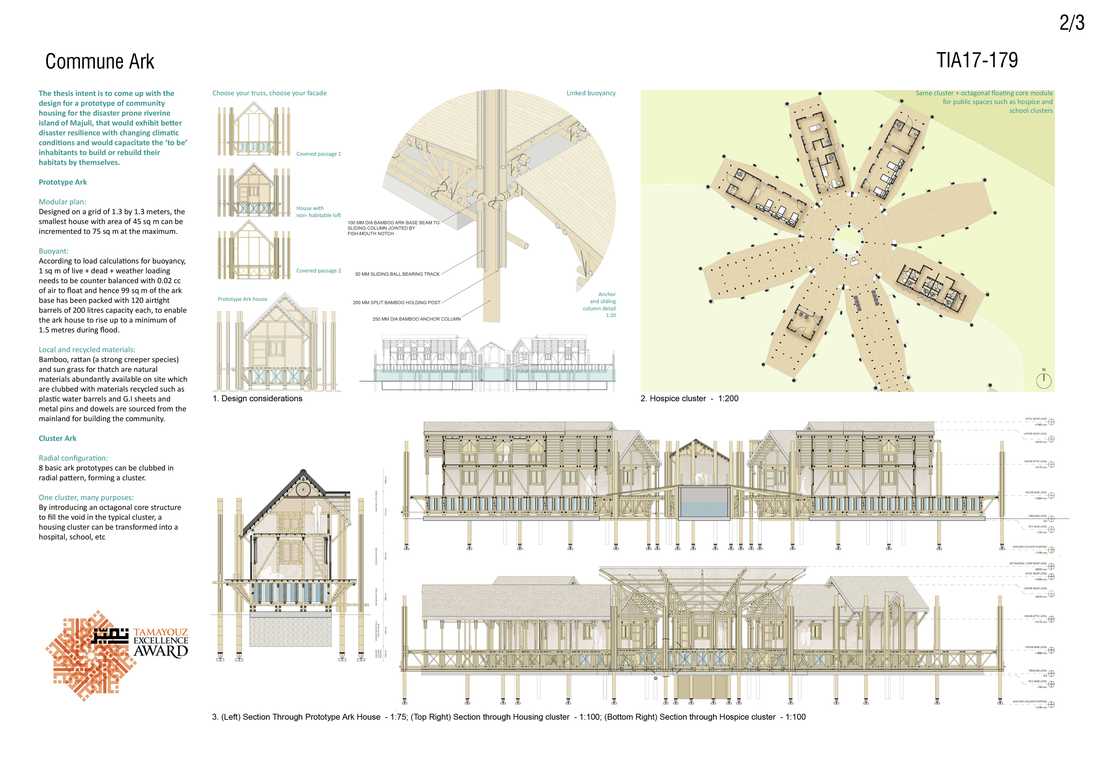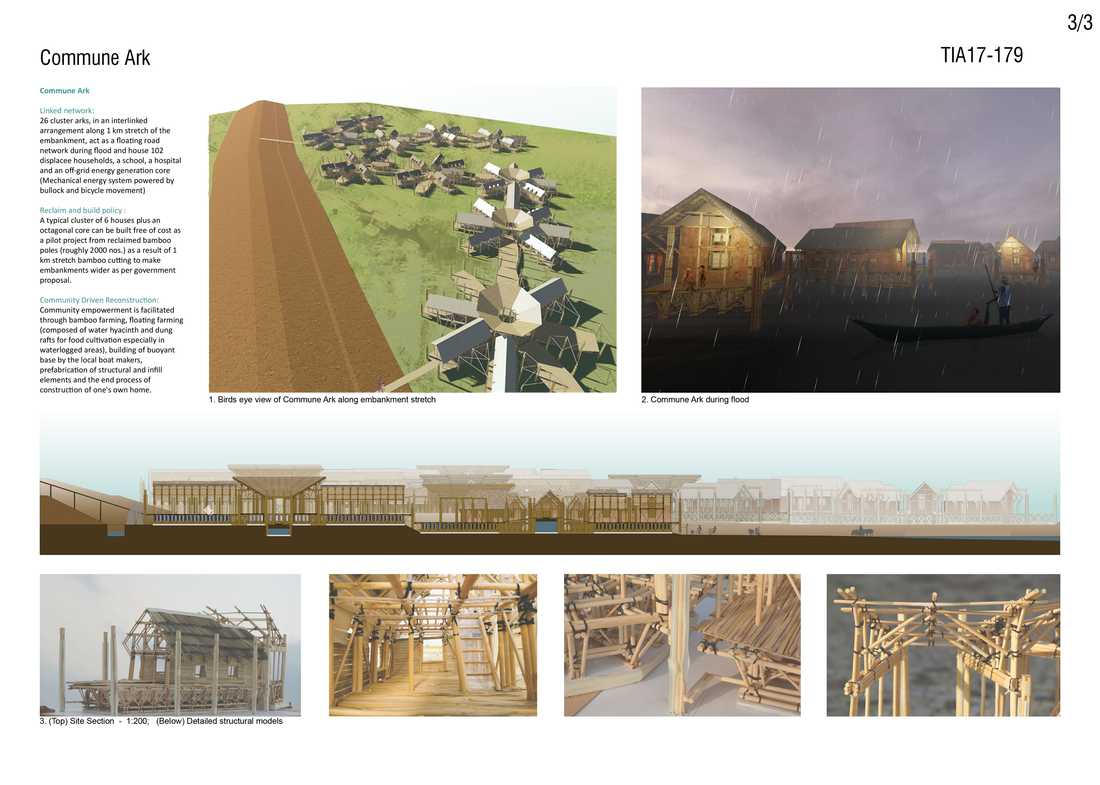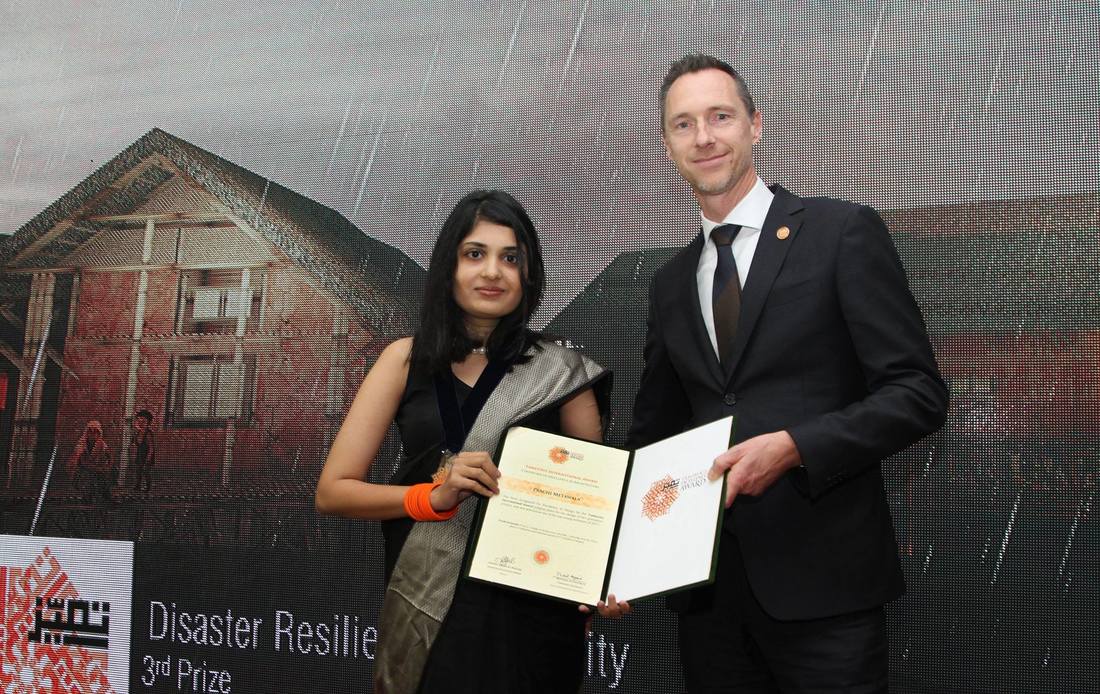Tamayouz International Award is open to architecture, urban design and planning and landscape design students around the world to submit their graduation projects. Tamayouz International aims to recognise and reward excellence in architectural design and education and celebrating the achievements of young architects at an early stage and giving them the opportunity to collaborate and support each other, empowering a generation of young architects to pursue their careers knowing that they can contribute towards the advancement of architecture in their communities.
The Third Prize was awarded to Prachi Metawala from the Sir J.J. College of Architecture, Mumbai – India, for her graduation project “Disaster Resilient, Self-Reliant Community for Displacees on Majuli Island, Assam, India”.
The Third Prize was awarded to Prachi Metawala from the Sir J.J. College of Architecture, Mumbai – India, for her graduation project “Disaster Resilient, Self-Reliant Community for Displacees on Majuli Island, Assam, India”.

Function of the project: Rehabilitation of Erosion affected IDPs (Internally displaced population)
Project description:
The project intent is to come up with the design for a prototype of community housing for the disaster prone riverine island of Majuli, that would exhibit better disaster resilience with changing climatic conditions and would capacitate the ‘to be’ inhabitants to build or rebuild their habitats by themselves.
Project description:
The project intent is to come up with the design for a prototype of community housing for the disaster prone riverine island of Majuli, that would exhibit better disaster resilience with changing climatic conditions and would capacitate the ‘to be’ inhabitants to build or rebuild their habitats by themselves.
Prototype Ark
Modular plan: Designed on a grid of 1.3 by 1.3 meters, the smallest house with area of 45 sq m can be incremented to 75 sq m at the maximum. Buoyant: According to load calculations for buoyancy, 1 sq m. of live + dead + weather loading needs to be counter balanced with 0.02 cc of air to float and hence 99 sq m of the ark base has been packed with 120 airtight barrels of 200 litres capacity each, to enable the ark house to rise up to a minimum of 1.5 metres during flood. Local and recycled materials: Bamboo, rattan (a strong creeper species) and sun grass for thatch are natural materials abundantly available on site which are clubbed with materials recycled such as plastic water barrels and G.I sheets and metal pins and dowels are sourced from the mainland for building the community.
Cluster Ark
Radial configuration: 8 basic ark prototypes can be clubbed in radial pattern, forming a cluster. One cluster, many purposes: By introducing an octagonal core structure to fill the void in the typical cluster, a housing cluster can be transformed into a hospital, school, etc
Commune Ark
Linked network: 26 cluster arks, in an interlinked arrangement along 1 km stretch of the embankment, act as a floating road network during flood and house 102 displacee households, a school, a hospital and an off-grid energy generation core (Mechanical energy system powered by bullock and bicycle movement) Reclaim and build policy: A typical cluster of 6 houses plus an octagonal core can be built free of cost as a pilot project from reclaimed bamboo poles (roughly 2000 nos.) as a result of 1 km stretch bamboo cutting to make embankments wider as per government proposal. Community Driven Reconstruction: Community empowerment is facilitated through bamboo farming, floating farming (composed of water hyacinth and dung rafts for food cultivation especially in waterlogged areas), building of buoyant base by the local boat makers, prefabrication of structural and infill elements and the end process of construction of one's own home.
Modular plan: Designed on a grid of 1.3 by 1.3 meters, the smallest house with area of 45 sq m can be incremented to 75 sq m at the maximum. Buoyant: According to load calculations for buoyancy, 1 sq m. of live + dead + weather loading needs to be counter balanced with 0.02 cc of air to float and hence 99 sq m of the ark base has been packed with 120 airtight barrels of 200 litres capacity each, to enable the ark house to rise up to a minimum of 1.5 metres during flood. Local and recycled materials: Bamboo, rattan (a strong creeper species) and sun grass for thatch are natural materials abundantly available on site which are clubbed with materials recycled such as plastic water barrels and G.I sheets and metal pins and dowels are sourced from the mainland for building the community.
Cluster Ark
Radial configuration: 8 basic ark prototypes can be clubbed in radial pattern, forming a cluster. One cluster, many purposes: By introducing an octagonal core structure to fill the void in the typical cluster, a housing cluster can be transformed into a hospital, school, etc
Commune Ark
Linked network: 26 cluster arks, in an interlinked arrangement along 1 km stretch of the embankment, act as a floating road network during flood and house 102 displacee households, a school, a hospital and an off-grid energy generation core (Mechanical energy system powered by bullock and bicycle movement) Reclaim and build policy: A typical cluster of 6 houses plus an octagonal core can be built free of cost as a pilot project from reclaimed bamboo poles (roughly 2000 nos.) as a result of 1 km stretch bamboo cutting to make embankments wider as per government proposal. Community Driven Reconstruction: Community empowerment is facilitated through bamboo farming, floating farming (composed of water hyacinth and dung rafts for food cultivation especially in waterlogged areas), building of buoyant base by the local boat makers, prefabrication of structural and infill elements and the end process of construction of one's own home.
Judging Panel's comment:
The use of appropriate technology and design sophistication to address a pressing social need is the hallmark of this considered and elegant solution.
The inhabitants of Majuli, a large inhabited river island, known for its rich biodiversity, routinely face devastating floods; the project deploys traditional materials and building methods to achieve a readily accessible solution for the communities who are relocated in housing structures that are more capable of responding to extreme flood conditions. This is a profoundly intelligent and admirable design, with a high level of technical expertise, proposing easy-to-maintain bamboo structures.
The use of appropriate technology and design sophistication to address a pressing social need is the hallmark of this considered and elegant solution.
The inhabitants of Majuli, a large inhabited river island, known for its rich biodiversity, routinely face devastating floods; the project deploys traditional materials and building methods to achieve a readily accessible solution for the communities who are relocated in housing structures that are more capable of responding to extreme flood conditions. This is a profoundly intelligent and admirable design, with a high level of technical expertise, proposing easy-to-maintain bamboo structures.
Tamayouz International Award for Excellence in Graduation Projects Worldwide 2018
Tamayouz is delighted to invite students of Architecture, Urban Design, Urban Planning, Architecture Technology and Landscape Design worldwide to register and submit their Graduation Projects. An independent international jury will review all entries and will select the winners of Tamayouz International Award. Closing Date for Submissions: 15 / August / 2018.
Full information can be found on the official awards website here: https://www.tamayouz-award.com/tamayouz-international.html
Full information can be found on the official awards website here: https://www.tamayouz-award.com/tamayouz-international.html
hPrachi Metawala from the Sir J.J. College of Architecture, Mumbai – India receiving her award at The Tamayouz Award Ceremony in Amman - Jordan 2018.e Sir J.J. College of Architecture, Mumbai – India
Scholarship, Awards and Prizes of the 2018 cycle
1st Prize: An MSc Scholarship for 2 Years at the University Polytechnic of Milan + Tamayouz Medal + Certificate.
2nd & 3rd Prizes: A Travel Scholarship for 7 days, accompanying the Architecture Students of Coventry University in their architectural field trip in 2019.
The Travelling Scholarship Covers Accommodation and Flights for the winner. **
7 X Honourable Mentions: Tamayouz Medallion + Certificate.
Shortlisted and Long-listed Entries: will be Featured in online publications and social media pages.
Tamayouz Supervisor of the Year: Given to the supervisor of the winning project or the supervisor with most entries supervised in the Top 10 Tamayouz Medal + Certificate
Tamayouz University of the Year: Given to the university of the winning project or the university with the most entries in the Top 10 Tamayouz Medallion
The Ceremony: An invitation to attend the Tamayouz Award Annual Ceremony for the winners mentioned above (Flight and Accommodation costs covered by the organisers for the TOP 3 winners of Tamayouz International), Every year Tamayouz International Award chooses a different city to host the ceremony, in 2016 it was held in Amman - Jordan. This year’s City will be announced later in the year.
*Prizes are per entry, for team entries, prizes will be split between the team members evenly.
**The Travel Scholarship has a limit of $1500 per winning entry.
2nd & 3rd Prizes: A Travel Scholarship for 7 days, accompanying the Architecture Students of Coventry University in their architectural field trip in 2019.
The Travelling Scholarship Covers Accommodation and Flights for the winner. **
7 X Honourable Mentions: Tamayouz Medallion + Certificate.
Shortlisted and Long-listed Entries: will be Featured in online publications and social media pages.
Tamayouz Supervisor of the Year: Given to the supervisor of the winning project or the supervisor with most entries supervised in the Top 10 Tamayouz Medal + Certificate
Tamayouz University of the Year: Given to the university of the winning project or the university with the most entries in the Top 10 Tamayouz Medallion
The Ceremony: An invitation to attend the Tamayouz Award Annual Ceremony for the winners mentioned above (Flight and Accommodation costs covered by the organisers for the TOP 3 winners of Tamayouz International), Every year Tamayouz International Award chooses a different city to host the ceremony, in 2016 it was held in Amman - Jordan. This year’s City will be announced later in the year.
*Prizes are per entry, for team entries, prizes will be split between the team members evenly.
**The Travel Scholarship has a limit of $1500 per winning entry.




 RSS Feed
RSS Feed